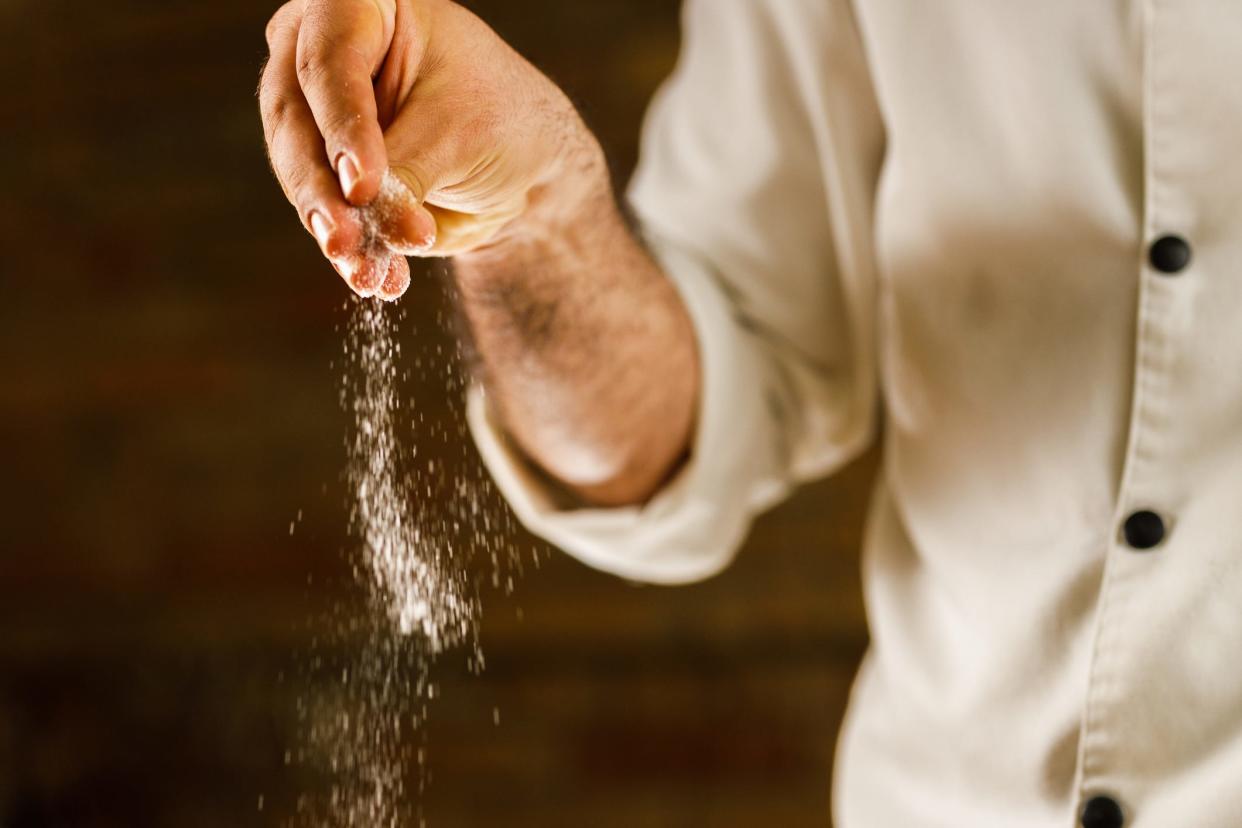Cutting back on salt can lower your blood pressure as much as common medications, study finds

Consuming less sodium (salt) can help reduce blood pressure as well as medication, a study suggests.
High blood pressure can lead to heart attack or stroke, and you may not know you have it.
Reducing sodium by eating fewer processed foods can be helpful even if you're otherwise healthy.
Cutting just a teaspoon of salt per day from your diet could lead to better heart health in as little as one week, new research suggests.
The modest reduction in dietary sodium (better known as salt) has been found to reduce blood pressure as much as common medications, according to a small study published November 11 in JAMA, the Journal of the American Medical Association.
Researchers from Vanderbilt University Medical Center looked at data from 213 adults aged 50 to 70 from Chicago and Birmingham to see whether the amount of salt they had in their diets might affect their blood pressure. The participants were randomly assigned either a week-long diet that was either high in sodium (2,200 mg per day, consumed in the form of two bouillon cubes, in addition to their usual diet) or low in sodium (just 500 mg daily, about a teaspoon less). Then they switched to the opposite diet for a week.
The researchers found that the low sodium diet led to major reductions in blood pressure on the low-sodium diet compared to the high sodium diet, but also compared to participants' usual diets. And the results held true regardless whether or not the participants were taking blood pressure medication.
The findings suggest that nearly everyone could benefit from better blood pressure by eating less salt, according to Norrina Allen, co-principal investigator of the study and professor of Preventive Medicine at Northwestern University Feinberg School of Medicine.
"We found that 70 to 75% of all people, regardless of whether they are already on blood pressure medications or not, are likely to see a reduction in their blood pressure if they lower the sodium in their diet," Allen said in a press release.
Healthy blood pressure can help prevent heart attack and stroke
Even people with normal blood pressure at the start of the study saw improvements, according to the results.
Having a healthy blood pressure level is important to reduce the risk of heart disease and stroke, since hypertension, or high blood pressure, can cause stress and damage to the blood vessels, heart, and even other organs such as the eyes, doctors previously told Insider.
As many as half of American adults have high blood pressure, and it can be a "silent killer" to any gender, since the only way to know you have it is to test for it, according to cardiologists.
Healthy lifestyle habits to reduce blood pressure include regular exercise, stress management, and good nutrition.
Paying attention to how much salt is in your diet, and cutting back even a little, could be an accessible step toward improving heart health and preventing serious illness, Allen said in the press release.
"High blood pressure can lead to heart failure, heart attacks and strokes because it puts extra pressure on your arteries," she said. "It can be challenging, but reducing your sodium in any amount will be beneficial."
Salt can add up in your diet with foods like canned soups, chips, condiments
The current Dietary Guidelines recommend limiting sodium to 2,300 mg or less per day. That's about one teaspoon in total. The American Heart Association recommends even less at 1,500 mg per day.
Some of the biggest culprits for dietary sodium include foods like cured meats, cheeses, canned soups, savory snack foods like chips, and condiments including ketchup and salad dressing.For instance, one can of condensed chicken noodle soup contains about 2,225 mg of sodium, nearly the entire recommended daily amount. One tablespoon-sized serving of salad dressing can have as much as 370 mg of sodium.
Participants in the study were getting about 4,500 mg per day, nearly twice the recommended amount, in their usual diets.
However, they saw big improvements after just a week on the low sodium diet, and there weren't any side effects.
While the participants followed a specifically designed diet of meals and snacks provided for them, you don't need experts to prepare and eat low sodium meals at home. The DASH diet, which stands for Dietary Approaches to Stop Hypertension, is a popular way to eat healthfully by including more fruits, vegetables, nuts, and whole grains.
The results of the most recent study suggest strategies to cut back on salt could make a big difference in people's health worldwide, according to Dr. Cora Lewis, study co-investigator and professor of medicine at the University of Alabama at Birmingham.
"It is particularly exciting that the products we used in the low sodium diet are generally available, so people have a real shot at improving their health through improving their diet in this way," Lewis said in the press release.
Read the original article on Insider

